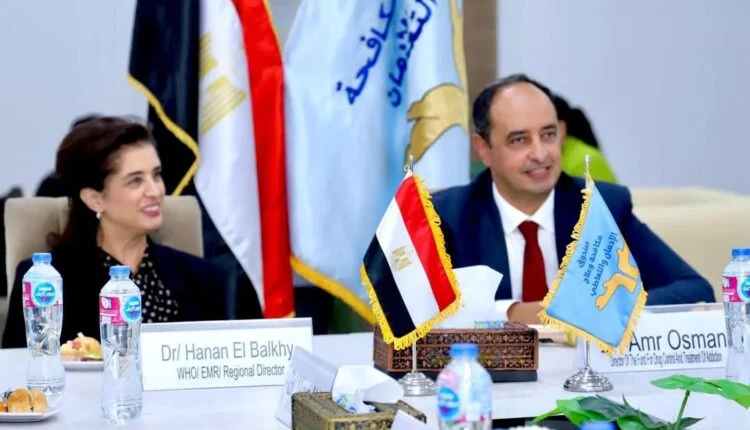
The World Health Organization (WHO) has lauded Egypt’s innovative and integrated approach to drug addiction treatment, following a high-level visit to the Imbaba Addiction Treatment Centre by Dr Hanan Balkhy, WHO’s Regional Director for the Eastern Mediterranean.
Accompanied by her delegation, Dr Balkhy toured the Imbaba facility—operated by Egypt’s Fund for Drug Control and Treatment of Addiction (FDCTA)—to observe firsthand the country’s acclaimed “Azima” centres, which have become a beacon of rehabilitation and recovery across the region.
Welcomed by FDCTA Director Dr Amr Osman, the WHO delegation visited the centre’s extensive infrastructure, including outpatient clinics, inpatient wings for men, women, and adolescents, and a dual-diagnosis unit addressing both psychological and substance use disorders.
The facility also features sports halls, green spaces, a football pitch, gymnasiums for both genders, music and IT rooms, a library, theatre, dining facilities, and vocational training workshops—integral to the centre’s “treatment through work” model.
Notably, much of the furniture and equipment within the centre was crafted by recovering patients in FDCTA’s vocational workshops—symbolizing both empowerment and sustainability.
Dr Balkhy also met with several recovered patients who shared their gratitude for the comprehensive, high-quality, and completely free services that include psychological support and social reintegration. She even joined patients in a friendly game of table tennis, highlighting the centre’s human-centered environment.
Dr Amr Osman presented Egypt’s national strategy to combat drug abuse, launched under the patronage of the President.
The plan focuses on preventive education in schools and youth centres, family-based early detection initiatives, and targeted interventions in high-risk areas. Currently, 34 centres across 19 governorates offer free and confidential treatment through FDCTA or its partners via the national hotline 16023.
He also highlighted the impact of the “You Are Stronger Than Drugs” media campaign featuring international football star Mohamed Salah, which led to a 500% surge in treatment requests.
The campaign has received multiple global accolades, including a United Nations honour and an award at the Dubai Lynx Festival of Creativity.
Dr Balkhy praised Egypt’s multi-sectoral, evidence-based strategy, calling it a “pioneering model” in addiction care.
She expressed strong interest in expanding Egypt’s role regionally by requesting technical support and staff training for addiction treatment institutions in other Arab countries.
Egypt’s experience, she noted, offers a compelling roadmap for countries seeking effective, compassionate, and sustainable solutions to one of the region’s most pressing public health challenges.



